- Winter 2022
- The Diverse Women in Law advocacy program

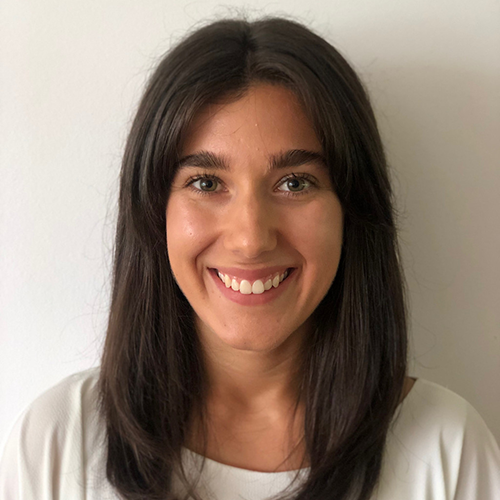
Many a barrister would dream of a court case where there is nothing at stake, no party bears costs and no accused is sent to gaol. There were, in fact, several of these court cases conducted in 2021, before numerous esteemed judges of the NSW District Court, Supreme Court and Court of Appeal, all in the spirit of encouraging advocacy and promoting diversity within the profession.
Members of the New South Wales Bar, along with members of the judiciary and the broader legal profession, came together to support the Diverse Women in Law (DWL) advocacy program in 2021, which concluded with the DWL advocacy awards in 2022.
DWL, chaired by Justice Dina Yehia SC of the Supreme Court of NSW, is a not-for-profit organisation that promotes the empowerment of diverse women lawyers through networking, targeted mentoring and professional development opportunities within the legal profession.
In conjunction with sponsor firm Herbert Smith Freehills, DWL delivered its inaugural advocacy program comprising a civil law moot and a criminal law witness examination competition for DWL law students. The program was designed to promote intersectionality, diversity and inclusion.
DWL students who participated in the program gained advocacy and alternative dispute resolution skills, met peers from diverse backgrounds, and networked with accomplished legal advocates, including both junior and senior counsel.
All competitors identified as diverse women and were selected from a cross- section of NSW universities. Members of the New South Wales Bar participated as both coaches and judges throughout the rounds of the competition. The problem questions were written by representatives of the bar, as well as solicitors of the Office of the Director of Public Prosecutions.
Diversity and DWL – why is diversity important?
Diversity among the profession is fundamentally important to continuing community confidence in our legal institutions. Reflecting this diversity in our courtrooms works as a meaningful reflection of the Australian community. Despite Australia’s diverse community, diverse women (which DWL defines as women, non-binary and gender diverse people from diverse backgrounds) remain underrepresented in the legal profession, with a lack of statistics around their representation in the workforce. While representation of women in the law has increased considerably over the last two decades, diverse women remain largely under-represented, particularly at a senior level.1 DWL aims to address this issue.
The bar should be integral to encouraging and fostering this diversity among its ranks and among other branches of the profession, at all levels of seniority. It is essential that we encourage and mentor lawyers with diverse backgrounds, not only to enter the profession but to remain in the profession; to go to the bar and remain at the bar; to reach the senior ranks of the bar as well as the judiciary.
The DWL advocacy program
The DWL advocacy program brought fierce and fearless advocates-in-training together to participate in rounds of mooting and witness examination.
Each moot team was linked with a barrister to assist them in preparation for the moot, which involved written and oral submissions focussing on a tort law scenario.
Both written and oral submissions were marked by the participating judges.
In the witness examination competition, competitors took on the role of a barrister representing counsel for the defence or prosecution in a simulated criminal hearing, examining and cross-examining witnesses. The competition tested the competitors’ ability to develop a case theory and understand evidentiary issues. Each competitor had their own volunteer witness, whom they met for thirty minutes for a short conference, and then proceeded straight into the hearing. Each round involved a new factual scenario. Teams were awarded scores by judges with the highest-scoring team winning each round.
Each of the competitors displayed extraordinary advocacy skills worthy of winning over a jury or justifying a grant of special leave with ease. The judges were left in the unenviable position of having to select a winner among the high-calibre competitors.
WHAT WAS ABUNDANTLY CLEAR TO THE COACHES AND JUDGES IN THE PROGRAM WAS THAT THE FUTURE OF ADVOCACY IS BRIGHT, AND IT IS DIVERSE.
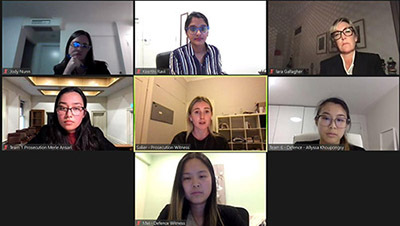
WHAT DID THE BARRISTERS HAVE TO SAY?
Many members of the New South Wales Bar donated their time, expertise and energy to the competition. This is what some of them had to say.
Daniel Pace – Seventh Floor Garfield Barwick Chambers
I was very impressed with what DWL has offered to students. The mentoring programs, advocacy competitions and CLEs have made a real contribution to our profession.
As a first-generation Australian, I think it is important to recognise and embrace the achievements of others from diverse backgrounds. DWL really assists people in coming together and being able to share their stories and experiences. I found it a great opportunity to share advice and give direction based on my experiences as a part of the legal profession. As a father of three young girls, I applaud the program and what it has to offer to our diverse women within the legal profession.
Christine Melis – Third Floor St James’ Hall Chambers
The members of my team were working women studying law. Their professional experiences were varied but they all came to the advocacy program with a common goal – to get out of their comfort zone and try something different and challenging. The moot certainly fit that criteria.
In each training session, we combined theory with practice; we talked about the tools of persuasion an advocate has at their disposal and the importance of bringing your audience along with you in your argument. By the end, each member of the team had grown in confidence; focussed on plain English and simplifying their arguments, and presented in both a persuasive and easy to listen to way. I was very proud of them. I enjoyed imparting what knowledge I have gained as an advocate and I only hope they too got something positive and meaningful out of the experience. Most of all, I hope the program inspired even one woman in my team to join the bar!
Rajiv Baldeo – Seventh Floor Garfield Barwick Chambers
My experience with my allocated competitor was fantastic and I thoroughly enjoyed the entire process. We had weekly Zoom sessions, often two or three, including the night before the competition. Given her commitment to the program, it was unsurprising that she did so well. Having only been at the bar myself for a couple of years, I have found myself imposing upon other practitioners in my time of need. I was pleased to be able to be the one providing the guidance and advice based on my experience as an advocate.
What did the competitors have to say?
Alexandra Zoras – witness examination
The DWL advocacy program offered an exciting opportunity to put our witness examination skills to the test and to receive fantastic feedback from professionals in the legal industry. The competition was good fun and intellectually stimulating, with interesting witness statements and sets of facts to draw upon. The program provided a supportive and all-inclusive environment which made for a great learning and social experience! Thank you to all who organised the DWL advocacy program, and to all judges and fellow competitors who made the competition one to remember.
Sophia Russo – moot competition
The program allowed me to network with inspirational peers, professionals and advocates within the legal field, improve my technical legal knowledge and skills including advocacy and ADR skills and also further develop my interpersonal skills. As a woman of diverse background, the DWL initiative promotes diversity and inclusion and is on the path to creating change within the legal profession in a manner that reflects the diversity of Australian society and I’m so glad I got to be a part of it.
Allyssa Khoupongsy – witness examination
Some of the biggest takeaways that I learnt from this competition are: First, preparation and structure is everything and will lead to your success. Secondly, work backwards. This means thinking about what you want your closing statement to be before you commence any preparation. Thirdly, and something I learnt from Justice Lonergan and Justice Yehia, the witness is most likely not going to accept everything, or even anything, you put to them – and that is okay. Lastly, and importantly, the biggest takeaway is the shift in my view of the legal profession. As a first-year law student some five years ago, I traditionally thought that to be an advocate, and a successful advocate, before the profession, you had to be an Anglo-Saxon man. Diverse Women in Law, and this program, reinforces the notion that that is not true, and diverse women can indeed be successful advocates.
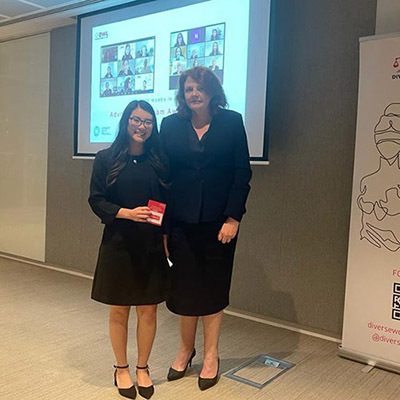
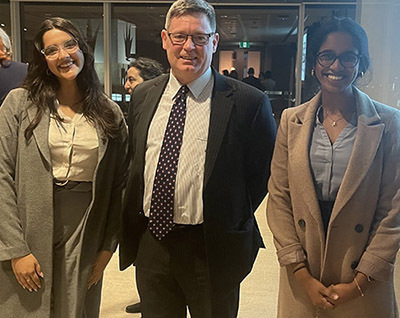
THE WINNERS
In what was an enthralling end to the competition, DWL gave its congratulations to DWL’s witness examination champion Allyssa Khoupongsy and runner-up Rania Joudeh, and civil moot champions Grace Wong and Juliette van Ratingen and runners- up Fayanne Cui, Judita Hudson, Kavya Nagpal.
• Award for best overall memoranda, best appellant memorandum, best respondent memorandum, and third place team in the final rounds: Aakriti Shoree, Brianne Perera, Nabeela Rasheed.
• Award for the best oralist in the preliminary rounds: Fayanne Cui.
• Award for the best oralist in the final rounds: Judita Hudson.
• Award for best oralist in the preliminary rounds: Rania Joudeh.
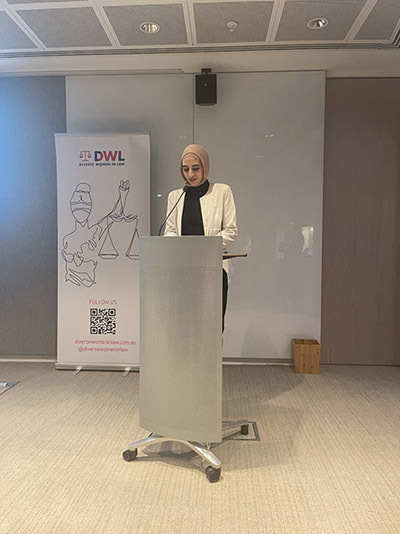
DWL THANKS THE MEMBERS OF THE NSW BAR AND JUDICIARY WHO CONTRIBUTED TO THE PROGRAM, INCLUDING:
The Honourable Justice Lucy McCallum; the Honourable Justice Julia Lonergan; the Honourable Justice Natalie Adams; the Honourable Justice Dina Yehia; his Honour Judge Craig Smith; her Honour Judge Deborah Sweeney; his Honour Judge Peter Whitford; his Honour Judge Richard Weinstein; her Honour Judge Sophia Beckett; Magistrate Stephen Barlow; Anish Bhasin; Awais Ahmad; Ben Katekar SC; Christine Melis; Christopher Withers SC; Damian Beaufils; Daniel Pace; David Mulligan; Daye Gang; Dr Katherine Fallah; Elisabeth Peden SC; Eric Vuu; Faraz Maghami; Georgia Lewer; Giles Stapleton; Grant Brady SC; Hollie Blake; Janet Manuell SC; Jayne Treherne; Jnana Gumbert; Julia Wang; Kate Eastman SC; Katherine Hooper; Kathleen Heath; Katrina Curry; Kyle Oliver; Lara Gallagher; Louise Beange; Lucy Nason; Madeleine Avenell SC; Miles Condon SC; Nicola Bailey; Nipa Dewan; Oshie Fagir; Patricia McEniery; Paul Annabell; Paul Matley; Peter Gray SC; Philip Strickland SC; Ragni Mathur; Rajiv Baldeo; Richard Pontello SC; Rose Khalilizadeh; Rosheehan O’Meagher; Sarah Gul; Sarah Pritchard SC; Stephen Dayeian; Sue Chrysanthou SC; Tammy Wong; Teni Berberian; Tiffany Wong SC.
BN
Rose Khalilizadeh is a barrister at Forbes Chambers. She is a Board Member of DWL.
Nina Prica is a law graduate at Maddocks and a volunteer with DWL.
ENDNOTES
1 For example, in 2018 only 1.2 per cent of practising certificate holders in New South Wales identified as Aboriginal or Torres Strait Islander (0.7 per cent across Australia). Less than 2 per cent of barristers identify as Asian-Australian. 25 per cent of law graduates identify as being from an Asian background, but this drops to less than 8 per cent at partner level.
